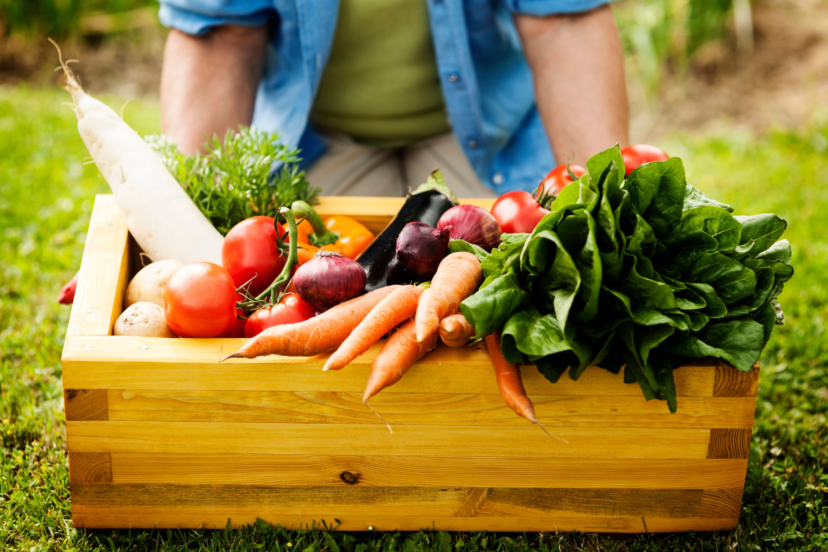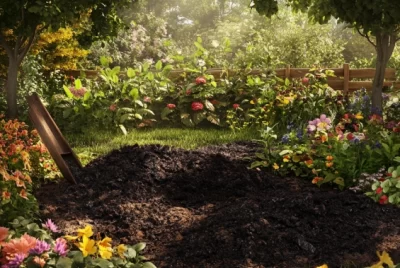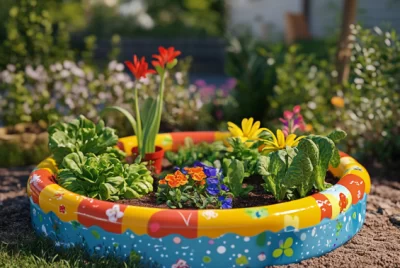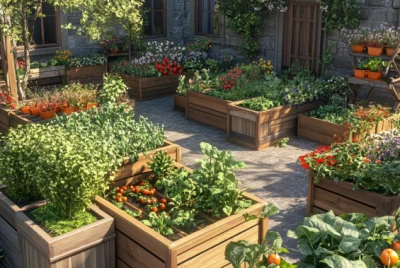Organic Gardening: Nature’s Way
Introduction
What is Organic Gardening?
Organic gardening is a way of growing plants that involves using natural resources and avoiding synthetic chemicals. When you choose to garden organically, you’re working with nature to create a healthy environment for both your plants and the wildlife around your garden. This approach helps maintain the natural balance of the ecosystem in your backyard or community garden.
Benefits of Organic Gardening
One of the best parts of organic gardening is that it’s safe for everyone: you, your family, and the animals that visit your garden. Without harmful chemicals, your garden becomes a safer place for children and pets to play. Plus, the fruits and vegetables you grow are healthier to eat. Not only that, but organic gardening also helps protect our planet. It reduces pollution and conserves water, making it a choice that benefits not just your home but the whole world.
Understanding the Basics of Organic Gardening
The Principles of Organic Gardening
To get started with organic gardening, it’s important to follow some basic principles. These include avoiding all synthetic chemicals like pesticides and fertilizers. Instead, you use natural products and methods to take care of your garden. Another important principle is to increase the variety of plants and animals in your garden. This diversity helps keep the soil healthy and reduces the chances of pests and diseases.
Key Practices in Organic Gardening
Composting
Composting is a fantastic way to recycle kitchen scraps and yard waste into rich soil to help your plants grow. You just pile up organic materials like leaves, vegetable peels, and even coffee grounds, and over time, they break down into compost. This natural fertilizer adds important nutrients back into your garden’s soil.
Crop Rotation
Changing the types of crops you plant in different spots each year is called crop rotation. This practice helps keep the soil from getting worn out because different plants need different nutrients. By rotating them, you help your soil stay fertile and reduce the risk of soil-borne diseases affecting your plants.
Natural Pest Management
Instead of using chemical sprays, organic gardening promotes natural ways to deal with pests. This can include planting certain flowers that attract insects who eat pests or using barriers to keep bugs away from your plants. Learning about and using these natural methods can keep your garden healthy and thriving.
Setting Up Your Organic Garden
Choosing the Right Location
The first step in creating an organic garden is to pick the best spot. You want a place that gets plenty of sunlight since most plants need about six hours of sun each day. You also need to think about water. Make sure your garden is somewhere that can be easily watered when needed.
Soil Preparation
Testing Soil Quality
Before planting anything, it’s a good idea to check your soil’s quality. You can get a simple test kit from most garden stores. This will tell you what your soil has and what it’s missing, so you can fix it naturally.
Improving Soil Fertility Naturally
Once you know more about your soil, you can improve it by adding compost and other organic materials. These natural additions help your soil hold onto water better and make it richer in nutrients, which helps your plants grow stronger and healthier.
Selecting Plants
Best Plants for Organic Gardens
Not all plants do well in an organic garden, so it’s important to choose ones that are known to thrive in natural conditions. Some good choices might include native plants, because they’re used to the local climate and soil, and therefore, need less special care to do well.
Understanding Plant Needs
Every plant has its own needs in terms of light, water, and soil type. Knowing these needs helps you place them in the right spot in your garden and care for them in ways that meet their natural requirements. This is crucial for growing a healthy organic garden.
This overview gives you a solid foundation for starting your own organic garden, covering the initial steps and principles. As you continue, remember that organic gardening is not just about avoiding chemicals—it’s about creating a thriving, natural ecosystem right in your own backyard.
Maintaining an Organic Garden
Water Management
Efficient water use is crucial in organic gardening. Not only does it save water, but it also promotes healthier plants. Here are a few tips:
- Efficient Watering Practices: Water your garden early in the morning or later in the evening when temperatures are cooler. This reduces water evaporation and ensures that plants have enough moisture to get through the day. Use a soaker hose or drip irrigation to deliver water directly to the roots where it’s needed most.
- Rainwater Harvesting: Collecting rainwater is a great way to reduce your water usage and keep your garden thriving. You can set up rain barrels to catch water from your roof. This water can then be used for watering your garden, saving you money and using a natural resource that might otherwise go to waste.
Weed Control Techniques
Controlling weeds without chemicals is a cornerstone of organic gardening. Here are two effective strategies:
- Mulching: Mulch is your garden’s best friend. It keeps the soil moist, improves its quality, and prevents weeds from growing. Organic mulches like straw, grass clippings, or bark chips can also add nutrients to the soil as they decompose.
- Manual Removal: Sometimes, there’s no substitute for getting your hands dirty. Pulling weeds by hand can be very effective, especially if done regularly. For the best results, pull weeds when they are young, before they have a chance to establish deep roots or spread seeds.
Pest and Disease Management
Managing pests and diseases organically involves prevention and natural treatments:
- Identifying Common Pests and Diseases: First, know what common issues look like. For example, aphids are small and can be green, yellow, or black, and they tend to cluster on the undersides of leaves. Powdery mildew, meanwhile, appears as white or grayish powder on leaves.
- Organic Remedies and Preventive Measures: Introduce beneficial insects like ladybugs or lacewings, which eat aphids. For fungal diseases like powdery mildew, try spraying affected plants with a mixture of baking soda and water. Always encourage healthy plant growth as the first line of defense, as strong plants are less susceptible to pests and diseases.
Advanced Topics in Organic Gardening
Permaculture Techniques
Permaculture is a design system that mimics the patterns and relationships found in nature:
- Principles of Permaculture: These include observing and interacting with nature, catching and storing energy (for example, by harvesting solar energy), and obtaining a yield (ensuring that your garden produces food, fiber, or other resources).
- Applying Permaculture in Your Garden: Start small by designing your garden layout to utilize natural resources efficiently. For instance, place taller plants like sunflowers to provide shade for heat-sensitive crops or use the slopes in your garden to manage water flow.
Biodynamic Gardening
Biodynamic gardening takes organic gardening a step further by considering spiritual, cosmic, and lunar influences:
- The Basics of Biodynamic Practices: This approach uses preparations made from fermented manure, minerals, and herbs to enhance soil health and plant growth. Planting is often timed according to lunar cycles, which are believed to affect plant growth.
- Preparations and Planting Calendar: You can use a biodynamic calendar to find the best days for planting, pruning, and harvesting, based on the moon’s phases and astrological positions. Preparations might include applying a horn manure spray (Preparation 500) to stimulate root growth and soil life.
The Impact of Organic Gardening
Environmental Benefits
Organic gardening helps conserve the environment in multiple ways. By avoiding synthetic chemicals, you reduce groundwater pollution, which helps maintain safe drinking water and protects wildlife habitats. Organic practices also tend to increase biodiversity in the garden, encouraging a variety of insects, birds, and other wildlife to thrive.
Health and Nutritional Benefits
Organically grown fruits and vegetables are free from chemical residues, making them safer and potentially more nutritious. Studies have shown that some organic produce can have higher levels of certain vitamins and antioxidants compared to conventionally grown crops.
Resources
To help you dive deeper into organic gardening and become more proficient, here are some resources you might find helpful:
Books and Guides
- The Organic Gardener’s Handbook by Frank Tozer: This comprehensive guide covers all aspects of organic gardening, from soil preparation to pest management.
- Rodale’s Ultimate Encyclopedia of Organic Gardening: Rodale has been a leading voice in organic gardening for decades, and this book is packed with valuable insights.
Websites and Online Courses
- Grow Organic: A great website offering a wide range of articles, tutorials, and organic gardening supplies.
- Gardening Know How: This site provides easy-to-understand information on organic gardening techniques.
- Online courses: Many websites like Coursera and Udemy offer courses on organic gardening that range from beginner to advanced levels, helping you understand the nuances and improve your techniques.
Conclusion
Organic gardening is much more than just a method of gardening; it’s a sustainable practice that contributes positively to our health, our environment, and our communities. By embracing organic principles, you’re making a commitment to nurturing a natural ecosystem. The benefits, as discussed, range from reducing your carbon footprint and promoting biodiversity to growing nutritious, chemical-free produce that’s good for you and your family.
Throughout this guide, we’ve explored various facets of organic gardening, from setting up your garden and maintaining it to adopting advanced practices like permaculture and biodynamic gardening. Each element plays a critical role in creating a successful organic garden: choosing the right location and preparing the soil sets the foundation; effective water and weed management ensure your garden thrives; and understanding pest and disease management helps keep your plants healthy.
Moreover, the environmental impact of adopting organic methods—such as water conservation and the reduction of chemical usage—highlights the broader positive effects of this practice. Health benefits also stand out, with organically grown foods often superior in nutrients and free from harmful pesticides.
In conclusion, whether you’re a novice gardener or someone with a green thumb, integrating organic gardening practices into your routine can lead to a rewarding, fruitful, and sustainable gardening experience. The resources provided can further aid in your journey, helping you grow a thriving garden that benefits both nature and your table. So, grab your gardening tools, embrace the organic methods, and enjoy the journey of creating a healthier, greener garden.
Frequently Asked Questions About Organic Gardening
1. What are the first steps to converting my traditional garden into an organic garden?
Start by eliminating the use of synthetic chemicals (fertilizers, pesticides, herbicides) and begin composting to create natural, nutrient-rich soil amendments. Test your soil to understand its needs and amend it using organic materials. Also, plan your garden layout to include crop rotation and biodiversity.
2. How can I make my own compost at home for my organic garden?
Collect kitchen scraps (excluding meat and dairy), yard waste like leaves and grass clippings, and other organic materials. Place them in a bin or a designated pile in your yard. Turn the pile periodically to aerate it, which helps speed up the decomposition process. In a few months, you should have rich, crumbly compost to use in your garden.
3. Can organic gardening methods really help manage pests without chemicals?
Yes, organic gardening encourages natural pest management strategies such as introducing beneficial insects, using barriers or traps, and planting pest-deterring plants. These methods aim to maintain a natural balance in the garden, reducing the reliance on chemical interventions.
4. What is crop rotation, and why is it important in organic gardening?
Crop rotation involves planting different types of crops in different areas of your garden each season. This practice helps prevent soil depletion, reduces the build-up of pests and diseases, and can improve soil fertility, making it a cornerstone of sustainable organic gardening.
5. Are there any specific plants that are easier to manage organically?
Yes, native plants and heirloom varieties often require less maintenance when grown organically because they are adapted to the local climate and soil conditions. These plants generally have better resistance to pests and diseases in their native environment, making them ideal for organic gardens.




